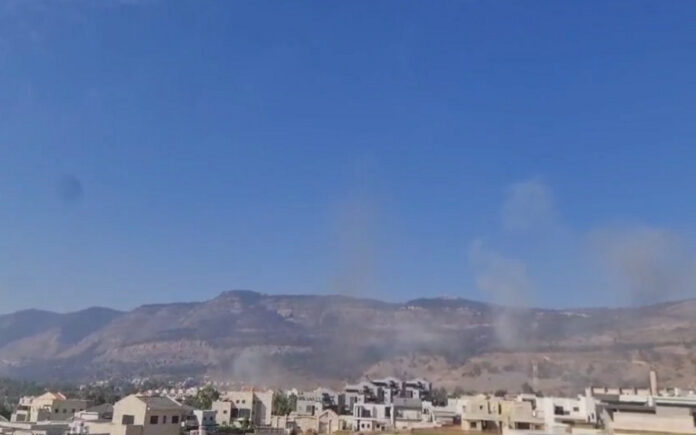Jerusalem: In a dramatic escalation of hostilities, Hezbollah has unleashed a significant rocket barrage aimed at northern Israeli cities, including Safed, Haifa, and Karmiel. This unprecedented attack marks a critical breach of the Iron Dome, Israel’s advanced missile defense system designed to intercept incoming rockets and artillery. The incident raises serious concerns about the system’s reliability, signaling a major setback in Israel’s air defense strategy amid fears of larger coordinated assaults.
For the first time since the 2006 conflict, rockets from Hezbollah have penetrated deep into central Haifa, testing Israeli defenses like never before. As missile sirens blare across multiple cities, residents are urgently seeking shelter. The unexpected failure of the Iron Dome, which has long been viewed as a technological triumph in missile defense, raises pressing questions about its effectiveness against sustained high-volume attacks from Hezbollah’s formidable arsenal.
The Factors Behind the Iron Dome’s Failure
The failure of the Iron Dome can be linked to Hezbollah’s sophisticated military capabilities. Unlike Hamas, which relies primarily on short-range rockets, Hezbollah boasts an extensive inventory of missiles, drones, and precision-guided munitions—many supplied by Iran. This gives Hezbollah not only a quantitative advantage but also a qualitative edge in its arsenal. Estimates from the Israel Defense Forces (IDF) suggest that Hezbollah possesses around 150,000 rockets and missiles, including thousands of precision-guided options that can strike deep within Israeli territory.
A pivotal reason for the Iron Dome’s shortcomings is the overwhelming scale of Hezbollah’s offensive. US officials and Israeli analysts have long cautioned that should a full-scale conflict arise, Hezbollah’s mass missile launches could potentially saturate Israel’s missile defense systems, including the Iron Dome. While the system has excelled at intercepting rockets from smaller-scale threats like those posed by Hamas, it struggles to contend with the high-precision, coordinated strikes that a well-equipped adversary like Hezbollah can execute. Israeli intelligence reports indicate that the growing stockpile of precision-guided munitions poses a significant challenge, as the Iron Dome is primarily designed to intercept less sophisticated, short-range rockets.
Also Read | Hezbollah Set Back by 20 Years Due to Israeli Strikes, Say US Officials
Understanding the Iron Dome
The Iron Dome serves as the foundational layer of Israel’s three-tier missile defense strategy, specifically designed to intercept short-range rockets and artillery shells launched from distances of 4 to 70 kilometers. Each battery integrates radar technology to detect incoming threats and a command-and-control system that assesses whether an interception is warranted. If deemed necessary, interceptor missiles are launched to neutralize incoming projectiles.
Developed by Israeli companies with considerable financial support from the United States, the Iron Dome has been essential to Israel’s defense architecture since its deployment. With a reported interception success rate exceeding 95%, it has been crucial in protecting Israeli cities from rocket fire, particularly during clashes with Hamas. However, the system’s effectiveness is contingent upon the types and volumes of rockets it faces. When confronted with a high-intensity, large-scale assault like that which Hezbollah is capable of, the Iron Dome may be overwhelmed.
Looking Ahead
Hezbollah’s successful breach of the Iron Dome has triggered alarm among Israeli officials and their US allies. As Israel braces for possible escalations, including a potential land incursion into Lebanon, the vulnerabilities of its air defense systems are now under intense scrutiny. This development highlights the increasing challenges Israel faces in securing its borders in a rapidly changing threat landscape.



